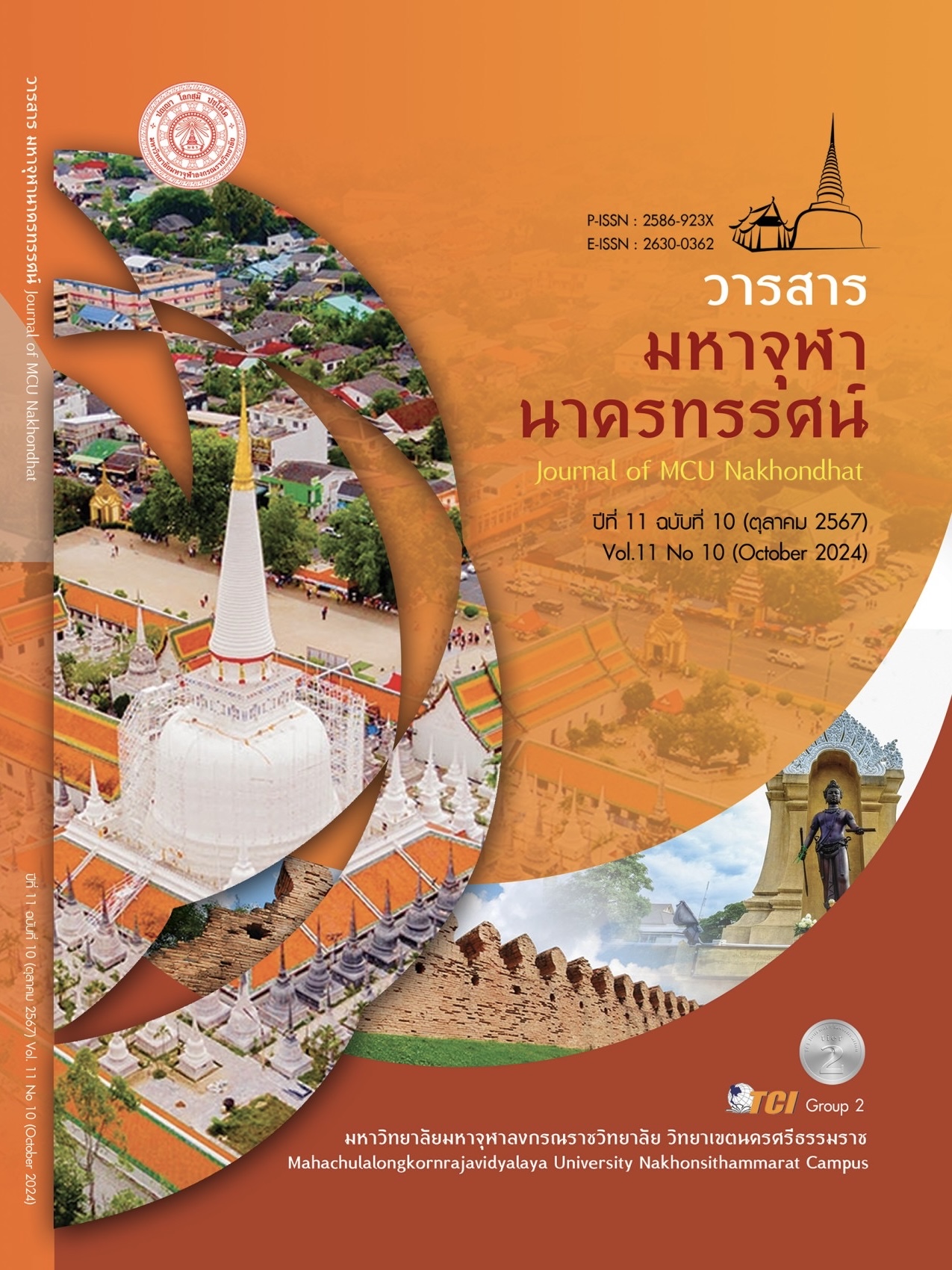POLITICAL THOUGHT ACCORDING TO THE VIEWS OF SOMDEJ PHRA BUDDHAKOSAJARN (P.A. PAYUTTO) THROUGH A BOOK LOOKING AT AMERICA AS SOLVING THAI PROBLEMS
Main Article Content
Abstract
This research article aimed to analyze political thought, analyze the causes of social and political problems, and analyze solutions to these issues based on the perspective of Somdet Phra Buddhaghosacariya (P.A. Payutto), as presented in the book "Looking at America to Solve Thai Problems." The qualitative study focused on document research, employing interpretive methods, and conducting descriptive content analysis. The findings revealed that Somdet Phra Buddhaghosacariya's (P.A. Payutto) political thought was directly influenced by Buddhist teachings, which could be divided into two key aspects: 1) The value of morality and ethics: Politics must bring about the greatest benefit to humans and all living things, benefiting oneself, others, and society; and 2) The system of governance: According to Somdet Phra Buddhaghosacariya (P.A. Payutto), the most effective system of governance is one that incorporates moral principles. Regardless of the form, if morality and ethics are present, it will yield the greatest benefit to society. Regarding the causes of social and political problems in Thailand from the past to the present, the study found that they stemmed from the application of Western political concepts without consideration of the Thai cultural context. This resulted in political and social instability. In terms of solutions to social and political problems, Somdet Phra Buddhaghosacariya (P.A. Payutto) suggested that the development of individuals in society based on Thai cultural wisdom, the cultivation of political ethics, and the creation of "Dhammocracy" as the foundation of democracy by applying Buddhist principles, would be critical to the development of Thai society and politics. The recommendation for future research is to conduct a comparative study of political problem-solving approaches between Somdet Phra Buddhaghosacariya and other thinkers within the framework of Buddhist thought.
Article Details

This work is licensed under a Creative Commons Attribution-NonCommercial-NoDerivatives 4.0 International License.
References
เฉลิมเกียรติ ผิวนวล. (2527). ความคิดทางการเมืองของ ปรีดี พนมยงค์. กรุงเทพมหานคร: สถาบันไทยคดีศึกษามหาวิทยาลัยศาสตร์.
พระครูสังฆรักษ์ สุริยะ ปภสฺสโร (สพานทอง). (2565). วิเคราะห์ปรัชญาสังคมและการเมืองการปกครองในทางพระพุทธศาสนา ของพระพรหมคุณาภรณ์ (ป.อ.ปยุตฺโต). วารสารปารมิตา, 4(1), 24-35.
พระพรหมคุณาภรณ์ (ป.อ.ปยุตฺโต). (2549). ธรรมาธิปไตยไม่มาจึงประชาธิปไตยไม่เจอ. กรุงเทพมหานคร: มูลนิธิพุทธธรรม.
พระพรหมคุณาภรณ์ (ป.อ.ปยุตฺโต). (2550). มองให้ลึก นึกให้ไกล ข้อคิดจากเหตุการณ์เดือนพฤษภาคม 2535. (พิมพ์ครั้งที่ 3). กรุงเทพมหานคร: สหธรรมิก.
พระมหาธานินทร์ กลิ่นหอม. (2563). การเมืองการปกครองไทยกับพระพุทธศาสนา. วารสารพุทธปรัชญาวิวัฒน์, 4(2), 92-105.
พระสมุทรวชิรโสภณ (โสภณ ธมฺมโสภโณ). (2563). พุทธธรรมาภิบาล: กลไกการปกครองเพื่อการอยู่ร่วมกันอย่างสันติ ของกลุ่มชาติพันธุ์ในภาคตะวันตก. วารสาร มจร สังคมศาสตร์ปริทรรศน์, 9(4), 102-113.
วิทยากร เชียงกูล. (2551). ปรัชญา การเมือง เศรษฐกิจ สังคม. กรุงเทพมหานคร: สำนักพิมพ์สารธาร.
สุขุม นวลสกุล และโกศล โรจนพันธ์. (2548). ทฤษฎีการเมืองสมัยโบราณและสมัยกลาง. กรุงเทพมหานคร: มหาวิทยาลัยรามคำแหง.
อัจฉรา หล่อตระกูล. (2560). หลักพุทธธรรมกับการบริหารกิจการบ้านเมืองที่ดี. วารสาร มจร สังคมศาสตร์ปริทรรศน์, 6(3), 237-251.
Harris, I. (2016). Introduction to Buddhism and the Political Process: Patterns of Interaction. In Kawanami, H. (ed.), Buddhism and the Political Process (pp. 1-10). London: Palgrave Macmillan.
Long, W. L. (2019). Tantric State: A Buddhist Approach to Democracy and Development in Bhutan. Oxford, England: Oxford University Press.
Strauss, L. & Levinas, E. (2006). Philosophy and the Politics of Revelation. Cambridge, England: Cambridge: University Press.


